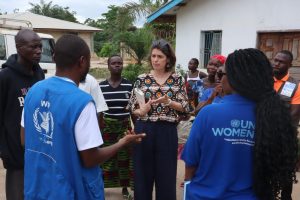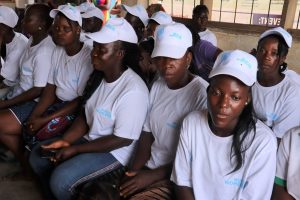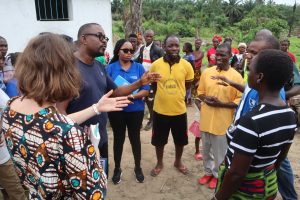


Residents of Korsein Town, Nimba County say the introduction of the joint UN Peacebuilding Fund project is enhancing peace, unity, and development among them while gender equality, women’s inclusion, and land dispute resolution are becoming the reality of everyday life.
According to the citizens, land conflict, particularly in post-war years, has had no respite and the people have felt the brunt of what they are calling “a big problem that was dividing us.” Joshua Daindah is a resident and a farmer who knows too well the painful headache land conflict has wreaked on the people. “Land conflict was a big issue here. Whenever it arose people used to rush there, fighting would erupt, and it was not easy. But now we have a land management committee set up by UN Women and others. Whenever there is land conflict, the committee investigates it and amicably solves the problem. We thank the UN for this project”.
In Liberia, land conflict is as old as the country itself. It is said to be among the oldest forms of disputes and is recognized as the biggest source of division surpassing ethnic and any other disagreements. Mr. Daindah admitted the issue is older than him. “Land conflict was here before the war. We came on earth and met our people inside. I was small and used to see some of it…”
In support of peacebuilding in post-war Liberia, the United Nations Peacebuilding Fund placed priorities on supporting women’s empowerment, youth engagement, and the furtherance of human rights. In 2020, a joint programme implemented by UN Women, UNDP and WFP commenced. The programme on “sustaining peace and reconciliation through strengthening land governance and dispute resolution mechanisms” is a three-years intervention funded by the UN Peacebuilding Fund through the UN Resident Coordinator’s Office in collaboration with the Liberia Land Authority, other national institutions and civil society organizations.
In Nimba County alone, the project has won admiration in Korsein, Yarsonnoh, and Gbayblain (these are just 3 of the 16 project communities visited) where it is making great gains in raising awareness on land conflict, domestic violence, and enhancing peace and women’s inclusion.
Korsein Town together with its surrounding hamlets is replete with stories of land conflict and domestic violence including wife-beating, which residents said the PBF project has helped prevent from spiraling out of hand. Giving an example, Kou Dolakeh, Chairlady of the Dolakeh Farmers Group, told a huge townhall meeting attended by visitors and locals, how a traumatic land conflict between a mother and her son was resolved after a long period of disunity and bad blood between them. “The conflict was over family land that divided the family and went to court. It was intractable. The case was finally resolved recently by the Land Management Committee in Korsein and everybody was satisfied”.
During the townhall meeting, the women took center stage, explaining that the PBF has given women of Korsein and surrounding settlements dignity, voice, and inclusion not only in household and family matters but also at community-level decision making.
In Yarsonnoh Town, on the main Ganta-to-Saclepea route, Kou Mehmakeh, Vivian Suah, Yador Cooper, and Amos Lekaryean disclosed that the PBF has united them, given them farming livelihoods, and there is no turning back. Vivian, smiling, moved forward and began to speak: “We are very happy about the PBF programme. It has united us and given us awareness – women, men, youth. We can now sit together to make decisions on land matters. In the past, it was not possible”. She emphasized the need to do more but said the fact that women are now part of decisions affecting them – especially regarding land ownership and access – is a historic milestone. Yador Cooper was even more emphatic: “In the past, only men always made the decisions and left women out. Now I can boast that I can even become a town chief of this community”.
Further down the main route is Gbayblain town where town chief Jenkins Yorkoi, Chairlady Maron Kenziah, Williatta Selekie and a host of over 15 women lauded the project and told fond stories of the PBF helping in solving issues around land conflict and domestic violence.
In both Korsein and Yarsonooh communities, the PBF is also supporting group farming activities. Supported by the World Food Programme (WFP), the people are growing improved varieties of groundnuts, corn, vegetables and will soon set action on lowland rice.
Beneficiaries – men, women, and youth – expressed satisfaction over the benefits the project has brought in terms of peace, unity, and agricultural livelihoods creation. They want it expanded to other communities and are urging the UN to support bigger actions around sustainability.
